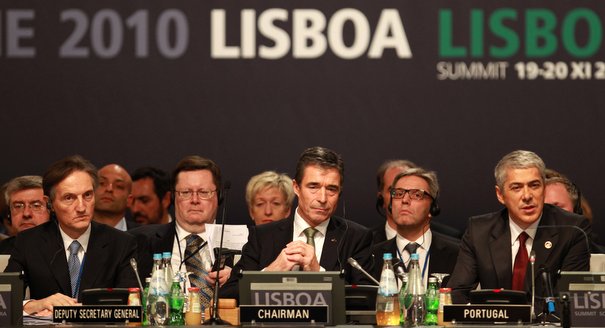Stefan Lehne

Source: Getty
Can Lisbon’s Potential be Realized?
The EU must learn how to overcome the current economic crisis before it can hope to successfully implement the Lisbon Treaty and strengthen its foreign policy.
Imagine for a moment that Washington decides its Afghanistan policy by consensus of the 50 states and following consultations with the Asia experts of Nebraska, Florida, and their 48 colleagues from the other states. Imagine further, that in addition to U.S. Secretary of State Hillary Clinton flying to Kabul to explain this policy, the foreign ministers of California, Texas, and others also arrive there to convey their own messages and priorities to the Afghan authorities. Imagine finally that the implementation of this policy is similarly decentralized, leaving it up to the governors and the legislators of the individual states to decide to what extent they wish to underpin the U.S. Afghanistan strategy with civilian and military resources.
This is how the European Union conducts its foreign policy today. Even though the EU appoints ambassadors, engages in summitry, decides on sanctions, and sometimes even sends troops abroad, it most definitely cannot be compared to a state. Moreover, European foreign policy cannot even be compared to other projects of European integration such as trade or monetary policy. In these areas competencies are transferred to Brussels or Frankfurt and common European institutions exercise functions that once belonged to member states. In foreign and security policy, common action at the EU level coexists with 27 national foreign policies, perceived by some member states to be indispensible elements of national sovereignty and identity.
In spite of these structural constraints, EU foreign policymaking has gone through important developments since its inception in the 1970s. The level of activity has increased greatly. The scope has been extended to security and defense, which used to be taboo subjects, and public support for establishing the EU as a real international actor has grown significantly.
Three factors determine the further development of the EU’s foreign policy:
- Incremental reforms through treaty change. Jean Monnet’s old dictum that integration requires institutions and timelines still holds true.
- The internal dynamism of European integration that also drives its external policies.
- The external challenges the EU faces, which require and stimulate an appropriate response.
The Lisbon Treaty foreign policy provisions represent the most ambitious effort at institutional reform in this area so far. The treaty is hardly revolutionary in character. The duality between EU foreign policy and that of members remains. Nor did Lisbon change the intergovernmental character of EU foreign policy or the consensus principle. But by strengthening the position of the High Representative, who replaces the rotating presidency and also assumes the functions of the External Affairs Commissioner, and through the creation of the European External Action Service (EEAS), Lisbon provides a new institutional framework that offers the potential of a more coherent and effective policy. Whether this potential is actually utilized, however, will depend on the way the new provisions are implemented. Lisbon could signify a more effective EU foreign policy, but it can also mean stagnation or even decline.
The overall dynamic of European integration is obviously a key factor in this regard. If you have a common market with binding standards for 500 million people, a common currency, and an area without internal border controls (Schengen), you will inevitably have to manage the external implications of all this “commonness.” You will need effective mechanisms to defend the common interests in these areas at the international level and your neighbors and partners in other regions for their part will seek to engage you on these issues bilaterally and multilaterally. And this “spillover” of the internal progress in European integration into external relations almost inevitably also becomes interconnected with the more traditional aspects of foreign and security policy.
While the Lisbon foreign policy reforms were thus meant to respond to the deepening of European integration achieved over the past decade, their implementation is overshadowed by the deep and persistent current crisis of the EU. The financial, economic, and national debt crises of the last three years and the ongoing struggle to save the common currency constitute the worst possible context for a new departure in foreign policy. Permanent economic crisis management leaves little room for foreign policy on the agenda of policymakers. The pervasive sense of crisis saps the confidence needed for new ventures and the massive budgetary constraints faced by member states and the EU starve the new Lisbon structures of resources. Foreign policy costs money. Very little money means very little foreign policy.
External challenges are the third factor determining the development of European foreign policy.
The postmodern harmony and stability that reign over major parts of the European continent—in and of itself the greatest achievement of European integration—contrast with highly unstable and volatile situations in many other parts of the world. And as a result of globalization, the impact of developments in these regions on the security of EU member states is greater than ever before. Uprisings in Northern Africa can produce migration flows, which as a result of the Schengen Agreement, impact on all EU member states. Religious strife in South Asia can produce terrorist threats in Scandinavia. Piracy around the Horn of Africa can have important economic repercussions everywhere in the EU. Individually, member states can do relatively little about these developments. Only collective action on a regional and sometimes on a global level can have a significant impact.
In terms of its size, wealth, and overall resources, the EU as a whole certainly has the potential to have a significant influence on developments across the globe. At present however, due to the structural underdevelopment of EU foreign policy, the EU hardly ever succeeds in bringing its collective strength to bear and contributing to outcomes that correspond to European interests and values.
As regrettable as this deficit is today, it is bound to worsen in the future. The countries in the EU today collectively represented 15 percent of the world population in 1950, 7 percent today, and will represent 5 percent in 2050. In terms of their share of world GDP they had 28 percent in 1950, 21 percent today, and will have around 18 percent in 2050. Similar trends can be identified in many areas ranging from technological innovation to military power. They amount to a fundamental rebalancing of the international system as other continents catch up with Europe’s previously privileged position. While Europe’s overall situation remains enviable by most standards, its weight on the global scales is clearly diminishing. And what is true for the EU as a whole applies in even greater measure to the individual member states. Even traditional great powers such as Great Britain, France, and Germany will experience an accelerating decline in influence over the coming decades. If Europe wishes to play an important role in shaping the global decisions of the future, it will have to get better organized and act more coherently and effectively.
A more effective European foreign policy is no longer a dream of European enthusiasts but a necessary response to concrete changes in the international system. The Lisbon Treaty provides not a perfect but a serviceable blueprint for such a better foreign policy. But only a Union that deals successfully with the current crisis will have the confidence and strength to implement it in a credible fashion and allow the EU to finally get its international act together.
Stefan Lehne is a visiting scholar at Carnegie Europe in Brussels. He was formerly the political director of the Austrian Ministry for European and International Affairs and also served as a director in the Council of the European Union’s Directorate General for External and Politico-Military Affairs.
To reinvigorate debate over European foreign policy and Europe’s role in the world, Carnegie Europe is publishing a series of essays from leading policymakers, diplomats, experts, and journalists on Strategic Europe over the coming weeks. A new essay will appear every day.
About the Author

Senior Fellow, Carnegie Europe
Stefan Lehne is a senior fellow at Carnegie Europe in Brussels, where his research focuses on the post–Lisbon Treaty development of the European Union’s foreign policy, with a specific focus on relations between the EU and member states.
- What Can the EU Do About Trump 2.0?Article
- Can the EU Meet the Trump Moment?Commentary
Stefan Lehne
Recent Work
Carnegie does not take institutional positions on public policy issues; the views represented herein are those of the author(s) and do not necessarily reflect the views of Carnegie, its staff, or its trustees.
More Work from Carnegie Endowment for International Peace
- Europe on Iran: Gone with the WindCommentary
Europe’s reaction to the war in Iran has been disunited and meek, a far cry from its previously leading role in diplomacy with Tehran. To avoid being condemned to the sidelines while escalation continues, Brussels needs to stand up for international law.
Pierre Vimont
- Is a Conflict-Ending Solution Even Possible in Ukraine?Commentary
On the fourth anniversary of Russia’s full-scale invasion, Carnegie experts discuss the war’s impacts and what might come next.
- +1
Eric Ciaramella, Aaron David Miller, Alexandra Prokopenko, …
- Taking the Pulse: Can European Defense Survive the Death of FCAS?Commentary
France and Germany’s failure to agree on the Future Combat Air System (FCAS) raises questions about European defense. Amid industrial rivalries and competing strategic cultures, what does the future of European military industrial projects look like?
Rym Momtaz, ed.
- Macron Makes France a Great Middle PowerCommentary
France has stopped clinging to notions of being a great power and is embracing the middle power moment. But Emmanuel Macron has his work cut out if he is to secure his country’s global standing before his term in office ends.
Rym Momtaz
- How Can Europe Renew a Stalled Enlargement Process?Commentary
Despite offering security benefits to candidates and the EU alike, the enlargement agenda appears stalled. Why is progress not being made, and is it time for Europe to rethink its approach?
Sylvie Goulard, Gerald Knaus











